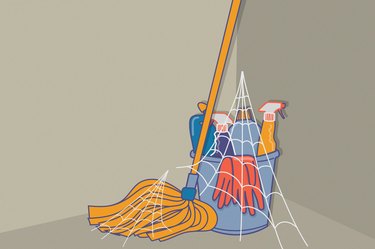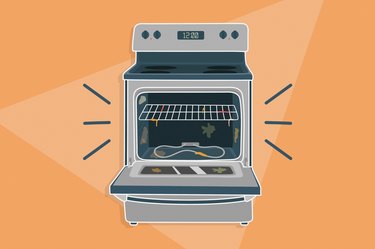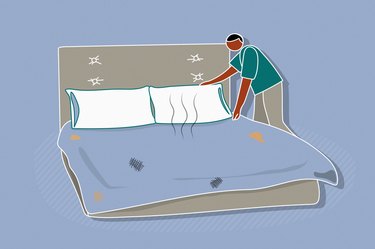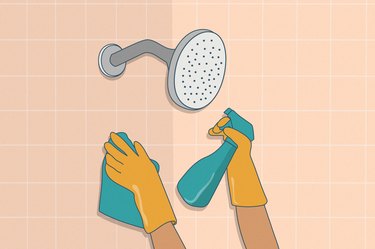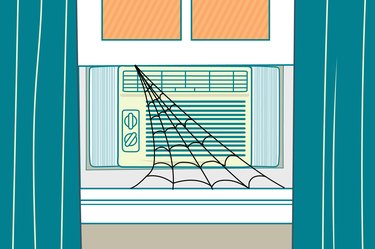
That first day of the year where it's warm enough to turn on the air conditioning can be a little bit thrilling (yay, spring!). But if you have a window unit, you may want to first consider giving the appliance a good cleaning.
Window AC units work best when they're cleaned monthly and given a thorough de-gunking once or twice a year, experts say.
Video of the Day
Video of the Day
"As the cool air hits the the warmer air around the machine, it can lead to condensation," explains Michael Rubino, founder of All American Restoration and author of The Mold Medic. This mixture of incoming moisture and dust particles already inside the machine is an ideal environment for mold growth.
That can have a negative effect on air quality. "Once the mold is established, the colony will start to produce spores and potentially microscopic toxins, which are then blown throughout the room," Rubino explains.
And if you have a mold allergy, it might also trigger your symptoms or make them worse.
Indoor air quality aside, keeping your unit clean helps ensure that it runs efficiently — and for as long as possible.
"Putting off maintenance could lead to costly repairs in the long run and a shorter lifespan for your unit," explains Sarah Jameson, marketing director for Green Building Elements. "Further, accumulated dust and debris decreases cooling quality," she adds, so your space stays uncomfortably warm. (If that happens, here are tips to cool down a room without AC.)
Frequent, consistent cleanings can help stave off these problems, Rubino and Jameson say. So what exactly should you be doing, and when? Here's their advice for how to prevent mold in a window air conditioning unit, plus tips on how to clean a window air conditioner without removing it.
Give Your Window AC Unit a Quick Cleaning Once a Month
Quick maintenance cleanings can keep mold and gunk from accumulating in your AC unit, which can help keep it running efficiently as well as make it easier to deep-clean when the time comes.
Fortunately, you don't need to pull the unit out of the window to get the job done, Jameson says. Here's how to do it:
- Unplug the unit and remove the front filter. Check the manufacturer instructions to locate your unit's filter and see the best way to take it out. "The front grill typically either pops off or unscrews, which will give access to the interior," Rubino says.
- Clean the filter. Check your manufacturer's manual for washing instructions. Typically it will recommend washing off the filter with a brush or rag dipped in water and soap or a mild detergent, Jameson says. If your filter isn't washable, thoroughly vacuum it with a HEPA vacuum, says Rubino. While you're at it, check the manual to see when the filter needs to be replaced. For most units, it's every three months.
- Let the filter dry. Putting a damp filter back into the unit can encourage mold and mildew growth, so let it sit out until it's completely dry. It'll happen faster if you can put it out in the sun on a dry day.
- Clean the inside. While the filter dries, give the inside of the unit a quick once-over. Vacuum it with a HEPA vacuum (use the soft-bristled attachment), paying particular attention to the fins if possible (the thin metal slats that run on the outside of the unit). Then spray the interior with 8 percent hydrogen peroxide (it breaks down built-up particles), let it sit for five to 10 minutes, and then wipe it down with a microfiber cloth, Rubino recommends. Allow the inside to fully dry.
- Put the filter back in and close up the unit. Once the filter and the inside of the unit are dry, you can reinstall the filter and close up the front grill.
Deep-Clean Your Window AC Unit at Least Once a Year
Even with regular maintenance cleans, dust and gunk can build up. Doing a deep clean once or twice a year can keep the problem in check, say Jameson and Rubino. Here's how:
- Unplug the unit and remove it from the window. It's a little cumbersome, but in order to get a thorough clean, you need to take the unit out of the window, Jameson and Rubino say.
- Remove and replace the filter. Most filters should be replaced every few months anyway, so chances are you're due for a new one.
- Remove and clean the grill. Spray the grill with 8 percent hydrogen peroxide and let it sit for five to 10 minutes before wiping with a microfiber cloth, recommends Rubino. Use a small scrubbing brush to tackle any hard-to-reach areas.
- HEPA vacuum the inside of the machine. Do this just like you would for monthly cleanings.
- Clean the inner parts. Spray the interior of the unit, the condenser coils and drip tray with 8 percent hydrogen peroxide solution. Allow the solution to sit for five to 10 minutes and gently wipe with a microfiber rag. Again, you can use a small, soft-bristled brush to tackle any hard-to-reach places, Rubino says.
- Put everything back together. Replace the filter, drip tray and any other items you removed (per the manufacturer instructions) to put the unit back together. If any of the fins were bent during the cleaning process, use a fin comb ($8.99, Amazon) to gently straighten them., recommends Jameson.
- Wash the outside of the unit. Do this the same way you cleaned the inner parts, recommends Rubino.
- Put the unit back in the window and plug it in. Now you're ready to enjoy some cool, clean air.
So, How Bad Is It Really to Never Clean Your Window AC Unit?
Skipping out on cleaning your window AC unit is bad for the appliance and your indoor air.
A dusty or mold-filled air conditioner will run less efficiently and ultimately break down sooner compared to one that's clean and cared for. Plus, it'll have a negative effect on your indoor air quality and potentially exacerbate mold allergy symptoms.
Is this an emergency? If you are experiencing serious medical symptoms, please see the National Library of Medicine’s list of signs you need emergency medical attention or call 911.

